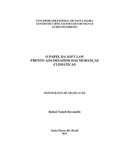| dc.contributor.advisor | Oliveira, Rafael Santos de | |
| dc.creator | Ravanello, Rafael Tatsch | |
| dc.date.accessioned | 2017-08-21T16:45:51Z | |
| dc.date.available | 2017-08-21T16:45:51Z | |
| dc.date.issued | 2013-12-13 | |
| dc.date.submitted | 2013 | |
| dc.identifier.uri | http://repositorio.ufsm.br/handle/1/11412 | |
| dc.description | Trabalho de conclusão de curso (graduação) - Universidade Federal de Santa Maria, Centro de Ciências Sociais e Humanas, Curso de Direito, RS, 2013. | por |
| dc.description.abstract | Since the second half of the 20th century, climate change concerns has reached the
international environmental political agenda. Currently, the high levels of concentration of
greenhouse gases and, as a result, the global warming, is one of the biggest challenges to the government decision makers. To control this situation States have looked for a better international regulation of the climate issue, but they haven’t used the traditional means to create rules of international law. They prefered to use instruments related to a phenomenon that is called soft law, which is an expression hard to define and which concept and limits are still under construction, but the basic idea is to set up a flexible regulation. For this reason, the present study aims to investigate the influence exercised by the soft law in the process of regulation of International Environmental Law related to the climate changes. In order to reach this objective were analyzed it main chatacteristics, the reasons that can lead to the use of soft law instruments and how it was inserted in the issue of climate change by the study of the two most important international meetings in history focused on the environment – Estocolmo-72 and Rio de Janeiro-92. On the meeting helded in Rio de Janeiro, it was created the United Nations Framework Convention on Climate Change (UNFCCC), a typical exemple of this new normative engineering and known as the main international regulatory instrument of the climate changes. Afterwards, this study analysed three important results of the UNFCCC: the Kyoto Protocol, the Clean Development Mechanism (CDM) and the Brazilian National Plan on Climate Change, to check the real contribution of soft law to the climate change regulation. By using the method of deductive approach, the historical, comparative and monographic methods of proceeding and, finally, the execution of research literature and documentary, it was possible to confirm that the role of soft law on climate change challenges was not just symbolical. Although it did not have the growth desired by many environmentalists, it yielded relevant results to themes related to the international climate change regulation. | eng |
| dc.language | por | por |
| dc.publisher | Universidade Federal de Santa Maria | por |
| dc.rights | Acesso Aberto | por |
| dc.subject | Convenção-quadro das nações unidas sobre mudança do clima | por |
| dc.subject | International environmental law | eng |
| dc.subject | United nations framework convention on climate change | eng |
| dc.subject | Mudanças climáticas | por |
| dc.subject | Soft law | eng |
| dc.subject | Climate change | eng |
| dc.subject | Direito ambiental internacional | por |
| dc.title | O papel da soft law frente aos desafios das mudanças climáticas | por |
| dc.title.alternative | The role of soft law on climate change challenges | eng |
| dc.type | Trabalho de Conclusão de Curso de Graduação | por |
| dc.degree.local | Santa Maria, RS, Brasil | por |
| dc.degree.graduation | Direito | por |
| dc.description.resumo | A partir da segunda metade do século 20 a preocupação com o cenário das mudanças
climáticas inseriu-se definitivamente na pauta das discussões ambientais internacionais. A concentração de gases de efeito estufa em níveis elevados e o consequente aquecimento global constitui-se um dos maiores desafios para os tomadores de decisões políticas na atualidade. Para conter os problemas decorrentes dessa situação os Estados buscaram uma melhor regulação em âmbito internacional da questão climática, mas para tanto não se valeram dos meios tradicionais de criação de normas jurídicas internacionais, mas sim de instrumentos relacionados com o fenômeno da soft law, termo de difícil conceituação, que permanece com limites ainda em construção e cuja ideia central é estabelecer uma regulação flexibilizada. Por essa razão, a presente pesquisa tem por objetivo investigar a influência exercida pela soft law na evolução da normatização do Direito Ambiental Internacional na esfera das mudanças climáticas. Para tanto, são examinadas as suas características principais, as razões que podem levar à sua utilização e como se deu a sua inserção no âmbito das mudanças do clima a partir do estudo dos dois maiores encontros mundiais que já trataram sobre o meio ambiente – a Conferência de Estocolmo e a Conferência do Rio de Janeiro.
Neste último, ocorrido em 1992, surgiu a Convenção-Quadro das Nações Unidas sobre
Mudança do Clima (CQNUMC), típico exemplo da nova engenharia normativa apontada e principal instrumento regulador da questão climática em nível internacional. Em seguida, também são analisados três importantes desdobramentos da CQNUMC, quais sejam: a criação do Protocolo de Quioto, do Mecanismo de Desenvolvimento Limpo e da Política Nacional Brasileira sobre Mudança do Clima, a fim de perquirir reais contribuições da soft law para o regramento da referida questão. A pesquisa valeu-se do método de abordagem dedutivo e dos métodos procedimentais histórico, comparativo e monográfico, além de utilizar como técnica de pesquisa, a bibliográfica e a documental. A partir do presente trabalho, foi possível confirmar que o papel exercido pela soft law, fenômeno que permanece em evolução, não foi meramente simbólico e, embora sem o alcance desejado por muitos ambientalistas, foi capaz de produzir resultados importantes para o regramento internacional de temas envolvendo as mudanças climáticas. | por |
| dc.publisher.country | Brasil | por |
| dc.publisher.initials | UFSM | por |
| dc.subject.cnpq | CNPQ::CIENCIAS SOCIAIS APLICADAS::DIREITO | por |
| dc.publisher.unidade | Centro de Ciências Sociais e Humanas | por |


